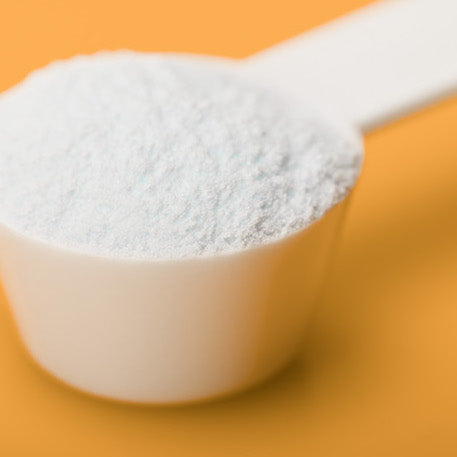It doesn’t matter if you’re an elite professional athlete or a weekend warrior who quarterbacks the family Thanksgiving flag football game – glutamine belongs in your arsenal of supplements.
Glutamine is one of the safest and most popular supplements available for improving athletic performance, and it’s a relatively inexpensive, highly effective addition to your regimen.
If you’re not familiar with glutamine already, get ready for a quick physiology lesson.
What is Glutamine?
Glutamine is an amino acid – one of the 20 “building blocks” of proteins found in the human body. It is present in a higher ratio in muscle and blood than any other amino acid.
Glutamine can be consumed from the diet and supplements, and the human body can even produce its own glutamine. The best dietary sources of glutamine are protein-rich foods such as eggs and meat.
However, high-protein foods contain a blend of different amino acids, and it is impossible to guarantee a specific amount or ratio of glutamine compared to other amino acids. When you choose to consume a high-quality glutamine supplement, you can be confident that you are getting exactly what you need.

Glutamine is one of 6 amino acids classified as “conditionally essential” for humans. This means that although most people can synthesize adequate amounts of glutamine for normal functions, in certain situations, requirements for glutamine increase beyond what can be naturally created by the body.
In these situations, such as intense exercise or physical stress, glutamine supplementation is necessary.
What Does Glutamine Do?
If amino acids were a baseball team, glutamine would be the utility player covering multiple positions in one game – perhaps not the most glamorous job, but rather a bit of an unsung hero!
Glutamine has a variety of functions in the body, including tissue building, hormonal balance, influencing metabolism, and regulating nutrients.
What are the Benefits of Glutamine?
Improved Endurance
Even if you’re not a stereotypical endurance athlete (think marathon runner), endurance is still an essential part of your athletic training. As your muscles work, multiple chemical processes take place simultaneously.
While each of these processes are vital, they also tend to create chemical byproducts.
Typically, the body can handle these byproducts – either by removing them altogether, or by converting them to something more beneficial and useful. However, sometimes the concentration of byproducts becomes so high that they overwhelm the body, causing muscle fatigue and poor athletic performance.
Over time, this diminished performance can negatively impact your progress and ability to reach your fitness goals efficiently and effectively. Glutamine supports your body’s regulation of chemical byproducts by allowing it to deal with them more efficiently.
One byproduct in particular – ammonia – is produced from protein breakdown and metabolism. Glutamine not only helps to reduce ammonia buildup, but also increases bicarbonate levels, which works as a buffering agent for lactic acid and other compounds.
As a result, glutamine allows for improved athletic endurance and overall performance.
Improved Glucose Metabolism
Glutamine exerts a significant impact on the way carbohydrates are utilized in the body. More specifically, glutamine can increase the amount of glucose stored in your muscles as glycogen.
During high-intensity workouts, glycogen serves as the first (and main) source of energy for muscles. Having the ability to store additional glycogen for use during training is a valuable benefit of glutamine supplementation.

Glutamine also helps to increase insulin levels. By providing increased levels of this important chemical messenger, glutamine can allow for more efficient use of carbohydrates and other nutrients in the body during exercise.
Additionally, if you have type 2 diabetes, glutamine has been linked to improved glycemic control, fewer cases of post-meal hyperglycemia, and decreased risk of developing cardiovascular diseases.
Muscle Preservation
Glutamine may also help in the preservation of existing muscle mass. As you exercise, your muscles become damaged in the form of microscopic tears to individual muscle fibers. While this is an essential element of muscle hypertrophy (growth), muscles require sufficient time and nutrients to recover.
If your muscles are not provided with enough time to rest and restore nutrient levels prior to working out again, they can actually be used for fuel! This process (catabolism) should be avoided at all costs.
Glutamine has the ability to slow catabolism and preserve your hard-earned muscle mass.

General Health Benefits
In addition to benefits related to athletic performance, glutamine also plays an important role in other bodily functions.
Glutamine is associated with an improved immune response, maintenance of a healthy brain, and intestinal health. If you want a strong, healthy body and a brain to match it, glutamine can provide you with a myriad of benefits.
Why Should You Take Glutamine?
As noted previously, intense athletic training can drastically deplete muscle glutamine stores. If glutamine levels are depleted and not restored through diet or supplementation, it can take the body several days to produce enough glutamine to naturally restore them.
Many athletes do not realize this is the case, and continue to work out on glutamine-deprived muscles, which commonly leads to fatigue, muscle breakdown, and injury.
If you train hard, glutamine supplements can help minimize muscle breakdown and improve protein metabolism. Supplementation can help speed up the process of glutamine synthesis, allowing you to get back in the gym sooner without adverse effects.






